- From the Editors
- Trump: Political Crisis, Right-Wing Policies, and the Resistance, Dan La Botz
- The Russian Revolution and Beyond, continued
- One Hundred Years of the Russian Revolution: A Retrospective View, Samuel Farber
- The Russian Revolution, Soviets, and Socialist Democracy, An Interview with Suzi Weissman
- The Tragic Fate of Workers’ Russia, Thomas Harrison
- Antonio Gramsci: From War to Revolution, Stefanie Prezioso
- Articles
- Looking Back at the June 1967 Middle East War, Stephen R. Shalom
- Self-Organization in the 2016 Palestinian Teachers Strike, Mike Noonan
- Socialism from Below? Bolivia in an Age of Extractivism, Nicole Fabricant and Bret Gustafson
- Puerto Rico and PROMESA: Reaffirming Colonialism, Pedro Cabán
- Remembering Dependency Theory, Edward Tapia
- U.S. Workers in the Late Neoliberal Era, Kim Moody
- The Left, the Right, and Globalization, Robin Hahnel
- Agrarian Reform and the Radicalization of Food Politics, Anthony Pahnke
- The Jewish Role in the Industrial Workers of the World, Bennett Muraskin
- Harvey, Klein, Smith, Foster: Militant Particularism and Ecosocialism, Brad Hornick
- Words & Pictures
- Art Spiegelman on Si Lewen, Paul Buhle
- Reviews
- The Real Tragedy of Che Guevera's Life, Hector Reyes Review of Farber, The Politics of Che Guevara: Theory and Practice
- At Long Last … A Complete Story of Attica, Liz Rapaport Review of Thompson, Blood in the Water: The Attica Prison Uprising of 1971 and Its Legacy
- Memories of Struggle and Despair In the Philippines, Alex de Jong Review of Quimpo and Quimpo, Subversive Lives: A Family Memoir of the Marcos Years
- Obituary
- Marvin Mandell, Who Fought for Equality, for Life, and for Art, Dan La Botz
New Politics Vol. XVI No. 3, Whole Number 63
In this issue:
From the Editors
Since Donald Trump has taken up residence in the White House, the country has faced a series of political controversies, a barrage of right-wing legislative and regulatory initiatives, a growing far-right movement, but also a broadening resistance from various sectors of society.
Trump: Political Crisis, Right-wing Policies, and the Resistance

Donald Trump’s first six months as president of the United States has been bad in so many ways that it is hard to know where to begin.
One Hundred Years of the Russian Revolution: A Retrospective View

At a distance of one hundred years, the Russian Revolution, which truly shook the world, deserves to be remembered once more in terms of its emancipatory significance and its downfall and betrayal. This revolution would not have happened had it not been for the crucial role played by the Bolshevik party. It is true that the profound crisis affecting the Russian society, worsened by the country’s disastrous participation in World War I, could have sooner or later led to a massive upheaval. But it is questionable that a socialist revolution would have taken place without the organizational skills of the Bolshevik party and the political, strategic, and tactical genius of V.I. Lenin.
The Tragic Fate of Workers’ Russia
.jpg)
[This is the second of three articles commemorating the Russian Revolution of 1917 and analyzing its fate under Stalin. The first part, “Glorious Harbinger of a New Society: the Bolshevik Revolution,” was published in the previous issue of New Politics, number 62, winter 2017. The text below is slightly expanded from what appeared in the print issue.]
Soon after the Treaty of Brest-Litovsk was signed on March 3, 1918, the Soviet republic was under siege. Various anti-Bolshevik forces, some supported by the Allies or the Central Powers, were gathering. If these forces succeeded in reversing the October Revolution, what would be the result?
Antonio Gramsci: From War to Revolution

Eighty years after his death, Antonio Gramsci is among the most influential Marxist intellectuals across the board. By the end of World War II, liberal intellectuals had already found in him “a Marxist you can take home to Mother.” The tone was set by Benedetto Croce, who allegedly gushed in 1947, upon reading Gramsci’s Prison Notebooks, “He’s one of us!”1 It reached the point that the Sardinian activist can be presented today as no less than the guarantor of “Italian Democracy.”2
Looking Back at the June 1967 Middle East War
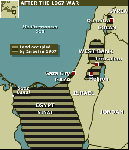
JUNE 2017 IS THE FIFTIETH ANNIVERSARY of the 1967 Middle East War—the June War or, as Israelis like to call it, the Six Day War.
Why should we care today about this historical event? For one, the war—with its resulting conquests, refugees, and shifting alliances—helped define the modern Middle East and make it one of the world’s great flash points for further conflict. But there are other reasons as well why this war bears re-examination.
Self-organization in the 2016 Palestinian Teachers Strike

From February 14 to March 13, 2016, 35,000 Palestinian teachers in the West Bank government-run school system were on strike. The teachers’ goal was to hold the Palestinian Authority to the terms of a 2013 agreement between the General Union of Palestinian Teachers (GUPT) and the Ministry of Education, an agreement the Palestinian Authority had reneged on for three years running. (Ma’an News, Feb. 16, 2016)
Socialism from Below? Bolivia in an Age of Extractivism

Bolivia received global attention for its anti-imperialist and anti-capitalist social movements in the twenty-first century. Best known perhaps were the Water Wars, against water privatization, in 2000 and the Gas Wars, demanding nationalization of the gas industry, in 2003. These rebellions entailed a radical rethinking of natural resource use and distribution.
Puerto Rico and PROMESA: Reaffirming Colonialism
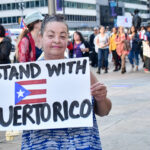
With this dramatic announcement, Governor Alejandro García Padilla transformed the island nation’s long-simmering debt overhang problem into an international spectacle. A financial mess that seemingly concerned only institutional investors, municipal bondholders, and some hedge fund managers exploded into a full-blown debt crisis with disquieting parallels to the situation in Greece.
Remembering Dependency Theory
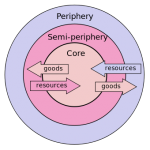
This article aims to show that dependency theory underlines vividly the problem of examining the logic of capital independent of Marx’s concept of value. It is impossible to completely understand the essence of Marx’s critique of political economy, especially a vision of an alternative to capitalism, without grasping value as distinct from exchange value. The distinction is of vital importance, since uprooting relations of exchange cannot itself eliminate the defining principle of capitalism: abstract labor, production for the sake of value.
U.S. Workers in the Late Neoliberal Era
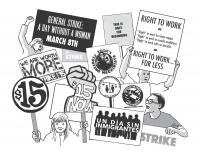
Capitalism in the United States and across the world has gone through a series of mind-bending crises, spatial “fixes,” and continuous restructurings that have disoriented organized labor in most of the developed economies since the beginning of the neoliberal era in the late 1970s and early 1980s.
The Left, the Right, and Globalization

Don’t be tricked into thinking that what is going on is a debate about “free trade”—the unhindered exchange of goods—because it is not.
Agrarian Reform and the Radicalization of Food Politics

If you’ve seen any of the documentaries that are critical of U.S. agriculture, then you’re most likely aware of the increase in some innovative and somewhat unconventional experiments in growing food—bee hives and gardens on hospital roof tops, abandoned warehouses turned into greenhouses, farms that double as a local community’s source of fresh produce and the pizzeria.
The Jewish Role in the Industrial Workers of the World

The most radical and militant union in American history was the Industrial Workers of the World (IWW), colloquially known as the Wobblies. Its active years were from 1905 to 1919, or at best until mid-1920 when it led its last major struggles—a maritime workers strike in California and a miners strike in Colorado. Fierce government repression during and after World War I, along with vigilante violence and internal divisions, dealt the IWW blows from which it never recovered. The mass industrial union movement during the New Deal passed it by. Yet, the IWW continues to exist on a small scale to this day.
Harvey, Klein, Smith, Foster: Militant Particularism and Ecosocialism
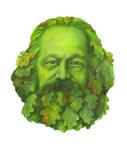
In “Militant Particularism and Global Ambition: The Conceptual Politics of Place, Space, and Environment in the Work of Raymond Williams” (1995), David Harvey discusses the challenges presented by moving from place out across time. In the midst of his involvement in a participatory research project within a high-stakes local struggle against the closure of an automotive plant, he was accused of being a “free-floating Marxist intellectual,” an outsider, and he was given the “evil eye” and asked to explain “where his loyalties lay.” (71) This is in an environment where people were losing jobs, and families and communities were being destroyed.
Art Spiegelman on Si Lewen
Reading, actually looking obsessively at the pages of, this volume and non-volume inevitably brings to mind an unpublished, uncompleted 1967 essay by Herbert Marcuse, “Lyric Poetry After Auschwitz,” translated and published after his death. Here Marcuse says, in part,
The Real Tragedy of Che Guevara's LIfe

In Latin America we have a saying, “Poner el dedo en la llaga,” a phrase that means to call attention to a delicate or worrisome point. However, llaga means literally an open sore or ulcer. I believe that Cuban socialist and scholar Samuel Farber puts his finger indeed on a significant sore point in revolutionary history with his latest book, The Politics of Che Guevara: Theory and Practice. While recognizing the undeniable determination, egalitarianism, and selflessness of Che Guevara in his fight against imperialism, Farber meticulously exposes the contradictions of Che’s thought and the political, economic, and social detours that Guevara took in his honest quest for a better world.
A Complete Story of Attica

Heather Ann Thompson has written a magnificent history of the Attica Prison uprising, the deadliest prison rebellion in U.S. history.
Memories of Struggle and Despair in the Philippines
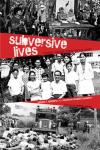
In the foreword to Subversive Lives: A Family Memoir of the Marcos Years, the authors write it “was not intended to be about communists and communism”—still the book provides remarkable insights into the Philippine communist movement. The book is a collective memoir of the surviving Quimpo family, relating their lives during the years of the Marcos dictatorship from the early seventies to the mid-eighties. With many of the siblings involved in the revolutionary movement, their memories furnish stories of underground organizing, imprisonment and torture, repression and resistance.
Marvin Mandell, Who Fought for Equality, for Life, and for Art

In 1996, at the height of the culture wars, Marvin Mandell joined the battle, writing a long essay, “Canon on the Left,” in which he argued that the left should not allow conservatives to claim the literary canon. While he of course supported the expansion of the canon to include all of the writers of color, as well as the women and all of the others who had been neglected and excluded, he refused to allow the right to claim the great tradition of European literature. He concluded the essay with these words:


